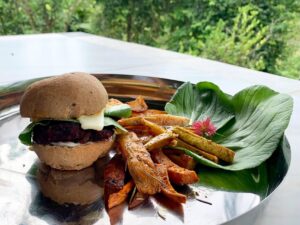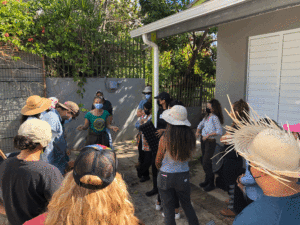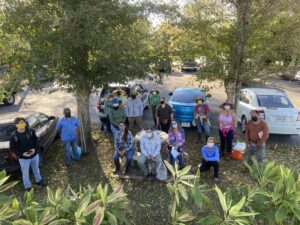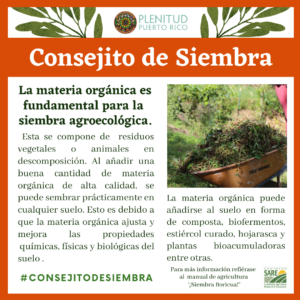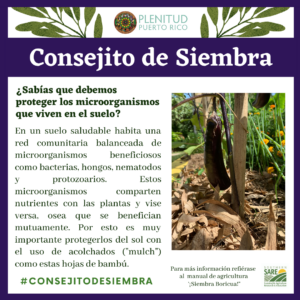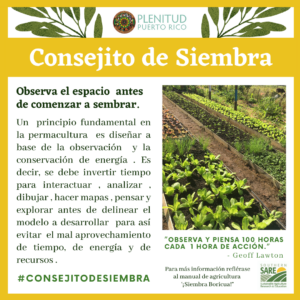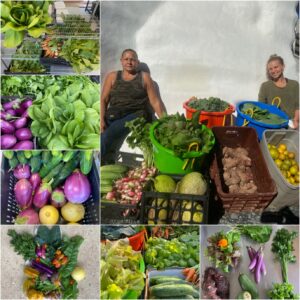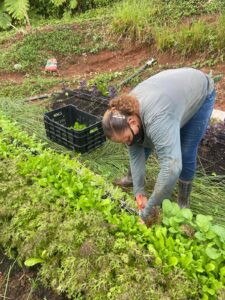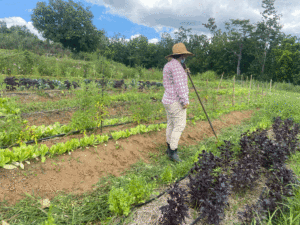Final report for EDS20-23
Project Information
Plenitud PR is an organization dedicated to teaching and demonstrating sustainability practices that promote a life in harmony with the environment. We carry out this mission through workshops, talks and community service across the island, and from our own farm and teaching center in Las Marías, Puerto Rico. We teach and demonstrate sustainability, permaculture and agroecology through such techniques as water runoff management practices for erosion prevention, agroforestry planting, compost systems, rainwater harvesting, intensive food planting and ecological bio-construction. We receive an average of 1,000 people a year who participate in workshops, internships, and 1-2 week apprenticeship programs, as well as volunteer programs and other educational activities. Our goal is to present viable sustainable alternatives to the many and increasing challenges faced by ordinary Puerto Ricans, such as climate change related natural disasters, economic uncertainty, and food insecurity. With the knowledge gained from our direct farm experience applying permaculture and agroecological practices, and through the experience gained in providing our educational programs, we have developed a 200 page agroecological manual, Siembra Boricua: Agricultura en Armonía con la Naturaleza (Translation: Manual for Agriculture in Harmony with the Natural Environment), complete with all the information and tools needed to produce food sustainably. This curriculum addresses the main challenges and key solutions through sustainable farming in a tropical climate, especially in Puerto Rico.
Despite the pandemic, our collaboration with SSARE has given us the means to further address the region's major food insecurity problem through intensive educational programs. This educational program has been based on the ¡Siembra Boricua! manual and we have equipped underserved beginning farmers with the tools needed to successfully and sustainably increase or begin local food production in Puerto Rico.
Through this SSARE supported project, Plenitud PR has offered: (1) 140 hour intensive agroecological training program accessible to 14 beginning or transitioning farmers; (2) 220 hour mentorship program for 2 participants of the previous intensive agroecological training program; (2) 7-month paid agroecological internship opportunities focused on sustainable intensive commercial production systems; continued to distribute the Siembra Boricua manual to be used as official curriculum for agriculture education. In the summer months we offered (1) 6-month internship on Nutrient Cycling and Agroforestry Systems Management and (1) 7- week internship on Small Scale Farm Administration ; developed new educational material that created sustainable and replicable programming for other small-scale farmers to use for many years to come.
Our educational objectives are designed not only to train future farmers in sustainable practices, but to generate sustainable, profitable programming that allow this work to continue beyond the scope of this project. Plenitud PR first offered our intensive agroecological training to provide theory and experience of key sustainable practices applicable to our tropical context, followed by additional focused group program opportunities, including a mentorship and internship, to more thoroughly train future sustainable farm managers. We have also created outreach components to disseminate the material more widely, and to increase visibility for the program so that it can be profitable and sustainable for years to come. Combined with our intensive production model, this approach generated sufficient income to repeat the program in the following years.
A primary goal for this SSARE-funded project was not only to provide high quality intensive education to beginning and transitioning farmers for the period of the initial project, but also to implement the education in a way that is self-sustaining and easily replicable. We provided these trainings and opportunities for sustainable farmers as a yearly programmatic effort, and thus we have instituted several mechanisms to allow for a long shelf-life for both the materials and the educational programs we present below.
- Provided a 140-hour intensive agroecological apprenticeships to (14) new farmers.
- Provided a 220-hour intensive long-term professional mentorship to (2) selected participants from the previous apprenticeship to receive extra and personalized training on how to not just be sustainable producers, but how to run their own business as well.
- Provided employment for (2) individuals for a paid 7-month agroecological internship focused on intensive production systems.
- Provided (1) 6-month internship experience in Nutrient Cycling and Agroforestry Systems Management.
- Provided (1) 7-week internship experience in Small Scale Farm Administration.
- Tested and distributed our spanish sustainable agriculture book, “Siembra Boricua: Manual de Agricultura en Armonía con la Naturaleza” (Translation: Manual for Agriculture in Harmony with the Natural Environment) with the new farmers in the educational programs and outreach programs.
- Revised and developed new spanish sustainable agriculture educational material, for use in our educational initiatives described above, our outreach initiatives and for other programs to replicate and use.
Other Complementary Goals Accomplished:
- Sold and distributed over 6,000lb of fresh produce as a means of income to maintain profitability of the project and be able to test and show viability of small scale sustainable operations. This has given more credibility to the model when proposed to rising farmers.
- Used the high-tunnel production system, as well as our agro-forestry systems, organoponics, and other productive systems of the farm, as living laboratories for testing sustainable practices (part of the revision and development of the educational curriculum in our agroecology manual) such as: worm composting, organic fertilizers, pest control, soil amendments, etc.
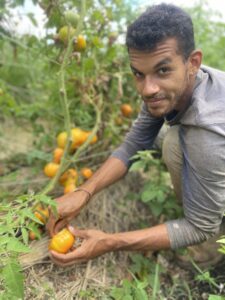
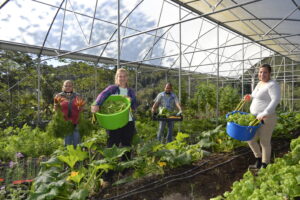
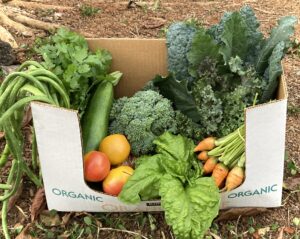
"Students of apprenticeship"

Cooperators
- (Educator)
- (Educator)
- (Educator)
- - Producer (Educator)
- - Producer
Education
This project has used an experiential learning and horizontal educational approach. The apprenticeships, mentorship and internships participants are learning to develop their farming skills as well as innovative sustainable practices through immersion at our teaching center. This immersion and empowerment in the field allows them to see the results of the application of these practices and gives them the confidence to apply them as well.
The project has also been organized utilizing the strategy of training the participants in a deliberate order using a tier system. This plan of action allows for the participants to have the opportunity to practice skills for a few months and then share them with others that are being trained, developing leadership skills at the same time.
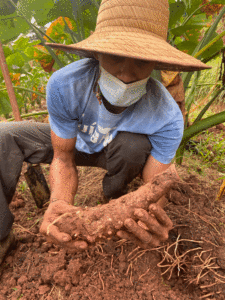
For example, the (2) interns after a few months of their internship helped lead the participants from the mentorship. The interns imparted the lessons learned in their experience to the new mentees. After a few months of experience, the mentees with the support of the project leaders and interns played a teacher assistant role in the intensive agro-ecological apprenticeship to the new students. This strategy empowered the students to have more conviction in what they learned as they teach it forward to others.
Educational & Outreach Activities
Participation Summary:
On Farm Educational Programing:
- Provided a 140-hour intensive agroecological apprenticeships to (14) new farmers. 20 workshop days were offered including 9 field days and 11 online theory days. Students also completed 50 contact hours in developed small scale farms learning the day to day practices and expanding their farmer network. The workshops were offered in a combination of virtual ones (due to Covid-19, in which theory was covered and hands-on field days offered at Plenitud PR farm and UPR, Mayagüez Campus farm where students plant and manage a 5,000ft^2 plot). **Our original plan was to impact at least 20 students during this workshop but due to Covid-19 restrictions, we had to reduce the number of participants.
- Provided over 220-hour of intensive long-term professional mentorship to (2) selected participants from the previous apprenticeship to receive extra and personalized training on how to not just be sustainable producers, but how to run their own business as well. The program ran for over 7-months. Both of the mentees received over 10 on farm demonstrations and 5 online trainings and later played a key role in assisting the team instructing at the apprenticeship, doing peer-to-peer learning. After this experience they began preparing their own farm/plot for production applying the lessons and skills developed in the mentorships and have now entered our recently created incubator program to continue supporting them in the development of their farms.
- Provided employment for (2) individuals for a paid 7-month agroecological internship focused on intensive production systems. The two interns completed over 15 on farm demonstrations and hands-on experience of the production and marketing from seeding to delivery. They also assisted in implementing the curriculum for the mentees previously mentioned. These two interns today have fully joined the Plenitud PR agriculture team and have key leadership roles in our farm production and the yearly apprenticeship, demonstrating practices and sharing experiences with other beginner farmers.
- Provided (1) 6-month internship experience in Nutrient Cycling and Agroforestry Systems Management. This intern, in contrast with the other two that were focused on intensive production, focused on activities that supported compost production systems with materials from the farm including thermal and static compost to increase soil fertility. He also gained experience in the management and production of green-manure and biomass, and agro-forestry management (including pruning and propagation of leguminous trees). He participated of over 5 on farm demonstrations and has now joined our team to continue developing these systems and gaining experience and soon wants to start producing in a 1 acre farm using the practices learned.
- Provided (1) 7-week internship experience in Small Scale Farm Administration. This was created as participants expressed the need to learn more about how to organize and manage farm operations, as well as financial skill sets such as effectively budgeting and determining economic viability in a small-scale intensive operation. This experience was unique as it focused on farm planning, creating efficient systems and methodologies, and farm accounting and finances, rather than working mostly hands-on in farming operations.
- Tested and distributed our spanish sustainable agriculture book, “Siembra Boricua: Manual de Agricultura en Armonía con la Naturaleza” (Translation: Manual for Agriculture in Harmony with the Natural Environment) with the new farmers in the educational programs and outreach programs. We have almost distributed 5,000 copies and have collected surveys and had dialogues with readers about how to make the Spanish educational tool more effective in furthering sustainable agriculture.
- Revised and developed new spanish sustainable agriculture educational material, for use in our educational initiatives described above, our outreach initiatives and for other programs to replicate and use. Not only is our curriculum fully replicable but created for different ages. It is also now available to share on in-person workshops but also in virtual spaces due to the pandemic. We have not only created written material but also videos with demonstrations of sustainable agriculture practices and interactive (digital and hardcopy) tools that program participants can use to design, plan and successfully run their small scale production. These materials have allowed us to easily share content with the general public, from commercial farmers to backyard gardeners and local consumers. As a result, we have been further enabled to raise awareness of the importance of sustainable agriculture and to continue reviving farm to table culture in Puerto Rico, increasing public support and demand for sustainably farmed goods and produce. (See education and Outreach description below)
Educational Outreach Activities:
- On Farm Demonstrations (Virtual) - as a response to the pandemic the team has offered 45 virtual on farm demonstrations. Almost weekly from March 2020 to April 2021, we have been presenting in Instagram, Facebook and Youtube a live on-farm demonstration following the curriculum of the book, ¡Siembra Boricua!: Manual de Agricultura en Armonía con la Naturaleza. The demonstrations present theory as well as the step-by-step on how to implement sustainable practices on the farm. Each of these on-site teaching demonstrations reached an average of 359 views through youtube which included farmers, educators and the general public. Link to Youtube playlist of uploaded demonstrations: https://www.youtube.com/watch?v=_IZEthylmtQ&list=PL5rlnawWpUe1gsbKZBCSKLkIhOWAR7TDb&index=1
- Children’s educational material - (2) Educational booklets where created accompanied by (3) demonstrational videos on How to build a garden, and on How to garden and a third video on How to recollect rain water to use for the gardens. This educational material was distributed among the youth and children of 4 of our local schools as well as widely through the internet. Link to Youtube playlist of uploaded childrens material:https://youtube.com/playlist?list=PL5rlnawWpUe0KKNG4gkuaPF19UhX8CzsH
- Factsheets - The team published what we call “Consejitos de Siembra” translated as “Planting Tips”. These planting tips highlighted topics discussed in the previous week’s “¡Siembra Boricua!” Lives video (On farm virtual demonstrations). In total, (20) tips on how to care for your garden, manage pests, create and maintain compost, among many more topics, were published on our social media platforms, having reach to over 22,000 people.
- Social media outreach - Throughout the project we published 49 sustainable agriculture educational videos on youtube, 160 on Instagram and 194 post on Facebook. These covered a variety of topics including: the current activities going on at the farm, updates about the intensive agriculture course, sustainable agriculture facts or ways to incorporate fresh harvests into nutritious meals. These posts, considering all three social media platforms combined, had 70,066 engagements from the general public.
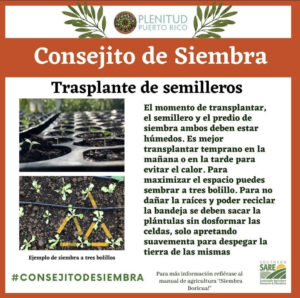
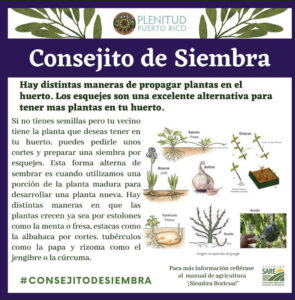
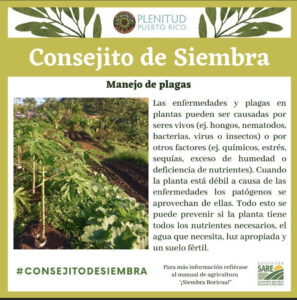
"These are samples of educational info sheets and posts created." - Farm planning educational tools - We created (4) excel sheets with equations included that help beginning farmers create a budget and crop plan for a small scale start up within our Puerto Rico socioeconomic context. The sheets also help visualize the map of the farm and how it constantly changes in the biointensive rotations. One of the tools also helps to create a fertilization plan. We also co-created (3) facilitation tools with the organization Pueblo Crítico that will help instructors guide one-on-one training with beginner farmers.
Mentorship Tool 2 (Spanish) pdf Mentorship Tool 1 (Spanish) pdf Mentorship Tool 3 pdf Small Scale Farm Budget Model Crop Plan and Income tool (Spanish) Crop Plan Map (Space:Time) tool (Spanish) Fertilization plan tool (Spanish)
- Blogs - The team published (3) educational articles on our blog focusing on agriculture, “Caring for a Raised Garden Bed”, “Gardening as Therapy.” and “A Super Market on Our Soil”. We also published (5) plant based recipe blogs, “Majado de Ñame: A recipe to connect us all”, "Puerto Rican Holiday Recipe Roundup", Tumeric English Muffins, Tulsi Sun Tea, Ama Pachana's Celery Root Vegetable Riceto continue creating demand for fresh produce and specialty crops (all in both spanish and english). Our community is notified of blog publications through emails, reaching around 5,000 people, and on our social media where we now have 32,000 followers.
- Tours - The team gave a virtual farm tour to over 35 people from the general public interested in learning more about growing their own food and becoming more sustainable. Through the virtual tour, participants learned different strategies to produce food sustainably as well as how to cook it. Since the recording was made public on our Youtube channel on March 24th, 2021, it has an additional 283 views.
- Webinars, Talks and Presentations - The team has presented the following: (3) Webinars in collaboration with the non-profit Para La Naturaleza directed to farmers in PR, with on average 303 participants for each. Para La Natrueleza serves to conserve the natural environment in Puerto Rico and promotes sustainability education for the general public. Their webinars with Plenitud PR are accessible on their Facebook page and continue to impact people. On average, 3,830 people have watched these educational webinars. You can access the webinars here:
(4) Virtual talks directed to (50) future farmers in Puerto Rico that are students from agricultural based high schools. In these talks we discussed how the sustainable agriculture program in Plenitud PR initiated, answered the questions that students had after watching our educational videos and virtual on-farm demonstrations, discussed what a career in agriculture looks like from education to producing food for the community, and conventional agriculture and the necessity and possibility of transitioning to sustainable practices.
9. Created an online food hub (link only open tuesdays mornings - thursday mornings) to facilitate marketing fresh produce of small scale sustainable farmers. This initiative has supported over (7) producers in our rural mountain region providing them an additional market stream to continue increasing weekly sales.
10. Offered (2) Consultations at our mentees farms, to support the start up of their production.
FUTURE ACTIVITIES:
The team will continue to:
- Offer the annual apprenticeship, internship and mentorship opportunities to beginner farmers
- Increasing production and on farm experiential learning facilities
- Develop educational material for both on farm participants as well as outreach initiatives in social media, blogs and email, not only including sustainable agriculture practices but also information on each crop’s benefits and recipe ideas to include them more in our diet.
- Offer virtual tours, webinars, talks and presentations as collaborations and requests arise.
- Develop and expand our online food hub and marketing efforts to increase small scale farmer sales and demand
New projects taking place or coming soon:
- Offer on farm tours as Covid restrictions decrease.
- Offer nutrition and plant based diet workshops to increase consumer awareness and demand for fresh produce.
- Create small scale sustainable farmer incubator to support start-up process of beginner farmers
- Offer one day workshops to community members to continue increasing sustainable agriculture awareness
Learning Outcomes
Project Outcomes
This project has affected agricultural sustainability in several ways. First of all, the foundation of the project is providing a living and viable model of a sustainable farm. This model serves to show in action and numbers how much this methodology can produce and serve to sustain farmers and give them quality of life. It also serves as a classroom as students get to practice the skills that are applied in the farm as part of their learning process. In other words, this project also contributes to sustainability as it trains new farmers in ecological agriculture which means in the near future there will be more and more farms using sustainable practices. One of the topics we cover in the courses is how conventional farming results in an excessive amount of gas emissions which studies show can be significantly reduced by applying organic matter to the soil among other soil protection practices. (https://grain.org/article/entries/4357-food-and-climate-change-the-forgotten-link). This means that as conscious sustainable farmers increase, greenhouse gas emissions will decrease while soil health and conservation practices in farms will continue to increase.
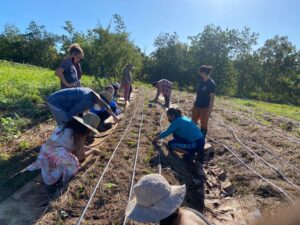
Furthermore, this project has benefited more than 5 farmers providing them with a salary while they are training and learning better practices and has benefitted 7 other producers by providing a market stream and support to increase their success. With in this marketing support, we had a big focus on creating agricultural sustainability awareness in consumer to increase in demand and therefore more success for small farmers. We reached over 70,000 consumers in social media, emails and outreach activities. During these activities we where able to ask 96 participants if their local specialty crop consumption and/or agriculture sustainability awareness had increased with our educational material and 94 said yes.
Evidently this replicable project has not only served as a small scale production model for beginner farmers to learn from and train at, but also it has provided substantial spanish educational material to reach farmers and consumers far from our farm and educational tools that can be widely distributed to continue to increase agricultural sustainability through awareness in our region.
Outcomes of Educational Activities:
- We directly impacted 20 beginner sustainable farmers through this first round of educational components including the apprenticeship (14), mentorship (2 participants) and internship (4 participants). The three expected outcomes measured were:
- Increased success of sustainable farmers by improving awareness of the importance of alternative agricultural practices
- Increased area consumer demand for products cultivated at local farms adopting sustainable techniques.
- Increase number of farmers adopting sustainable agriculture practices in Puerto Rico.
These outcomes were evaluated after collecting data of the following three indicators.
Outcome 1
- Indicator (a): coherence of educational material including theory and practice
18 or 90% of the participants affirmed the educational material had Coherency.
Outcome 2
- Indicator (b): engagement to share the knowledge
17 or 85% of the participants affirmed they shared or plan to share what they have learned in the educational programs.
Outcome 3
- Indicator (c) application of the knowledge
17 or 85% of the participants affirmed they are applying or plan to apply the sustainable agriculture practices they learned and practiced.
Outcomes of Outreach Activities:
- We impacted over 400 farmers/gardeners and over 70k consumers through our manual distribution, emails, blogs and social media efforts. We collected data from 211 of these people, situated locally in and around the area of Las Marias as well as other individuals from the extended general public of Puerto Rico. The three expected outcomes measured were:
- Increased success of sustainable farmers by improving awareness of the importance of alternative agricultural practices.
- Increased area consumer demand for products cultivated at local farms adopting sustainable techniques.
- Increase number of farmers adopting sustainable agriculture practices in Puerto Rico.
These outcomes were evaluated after collecting data of the following three indicators.
Outcome 1
- Indicator (a): coherence of educational material including theory and practice
208 or 98% of the farmers/consumers affirmed the educational material had coherency.
- Indicator (b): engagement to share the knowledge
173 or 81% of the farmers/consumers affirmed they plan to share what they’ve learned in the outreach programs.
Outcome 2 and 3
- Indicator (c) application of the knowledge
174 or 82% of the participants affirmed, for farmers or gardeners, that they are applying or plan to apply the sustainable agriculture practices learned and for consumers, that they are purchasing or are planning to purchase local products from local farms using sustainable practices.
